
Financial Innovation
Scope & Guideline
Exploring New Frontiers in Finance and Management
Introduction
Aims and Scopes
- Financial Technology and Innovation:
The journal emphasizes research on financial technologies (FinTech), including blockchain, cryptocurrencies, and digital payments, highlighting their implications for financial markets and institutions. - Risk Management and Financial Stability:
A core area of focus is on methodologies and models for assessing and managing financial risks, including market, credit, and operational risks, especially in the context of emerging technologies and economic crises. - Investment Strategies and Portfolio Management:
Research on innovative investment strategies, including the use of machine learning, artificial intelligence, and algorithmic trading to optimize portfolio performance and risk assessment. - Behavioral Finance and Market Dynamics:
The journal explores the psychological factors influencing investor behavior and market dynamics, particularly in the context of new financial instruments like cryptocurrencies and NFTs. - Sustainability and ESG Factors:
There is a growing emphasis on research addressing environmental, social, and governance (ESG) factors in financial decision-making and their impact on investment strategies.
Trending and Emerging
- Cryptocurrencies and Blockchain Technology:
Research related to cryptocurrencies and blockchain technology continues to rise, focusing on their market dynamics, regulatory implications, and integration into traditional finance. - Machine Learning and AI in Finance:
The application of machine learning and artificial intelligence in financial modeling, trading strategies, and risk assessment is increasingly prominent, showcasing the transformative potential of these technologies. - Sustainable Finance and ESG Integration:
There is a growing trend towards integrating sustainability considerations into financial decision-making, with research exploring the impact of ESG factors on investment performance. - Decentralized Finance (DeFi):
The emergence of decentralized finance (DeFi) as a significant area of study reflects the industry's shift towards blockchain-based financial services that operate without traditional intermediaries. - Behavioral Insights in Financial Decision-Making:
Research focusing on behavioral finance is gaining traction, emphasizing how psychological factors and social dynamics influence investment decisions and market outcomes.
Declining or Waning
- Traditional Finance Models:
Research focusing on traditional finance models, such as CAPM or efficient market hypotheses, has declined in favor of more innovative and technology-driven approaches, reflecting a broader shift towards data-driven decision-making. - Conventional Banking Practices:
Studies centered around conventional banking practices are less frequent, as attention shifts towards digital banking and FinTech innovations that disrupt traditional banking models. - Static Economic Indicators:
Research that relies heavily on static economic indicators without considering dynamic market conditions or behavioral factors has seen a decrease, as newer methodologies emphasize real-time data and machine learning. - Historical Financial Analysis:
There is a waning interest in purely historical financial analysis without a technological or innovative lens, as the focus moves towards predictive analytics and real-time market behavior.
Similar Journals
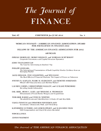
JOURNAL OF FINANCE
Exploring the depths of finance, economics, and accounting.JOURNAL OF FINANCE, published by Wiley, stands as a premier academic journal in the fields of finance, economics, and accounting. With a history dating back to 1946, the journal has consistently delivered impactful research that shapes financial theory and practice, boasting an impressive impact factor reflective of its high citation rate. Its Quartile 1 ranking in Accounting, Economics and Econometrics, and Finance illustrates its leading position within these disciplines. Although not an open access publication, the journal continues to be indispensable for researchers, professionals, and students seeking to advance their understanding and knowledge through rigorous empirical analysis and comprehensive reviews. With an esteemed global readership, the JOURNAL OF FINANCE remains committed to fostering the dissemination of innovative financial research well into 2024 and beyond.

Global Finance Journal
Uncovering insights that shape financial landscapes.Global Finance Journal is an esteemed periodical published by Elsevier, dedicated to the dynamic fields of finance and economics. With an impressive history spanning from 1989 to 2024, this journal holds a significant position in the academic community, boasting a Q1 quartile ranking in both Economics and Econometrics, as well as Finance, as of 2023. It is highly regarded in Scopus rankings, placing 40th out of 317 in Finance and 99th out of 716 in Economics and Econometrics, demonstrating its influence and reach among researchers and practitioners alike. Although not an open-access journal, the Global Finance Journal provides rigorous peer-reviewed articles that explore critical issues, advance theoretical frameworks, and address practical applications in global finance. As such, it serves as a vital resource for researchers, financial professionals, and students aiming to deepen their understanding of economic phenomena and contribute to the ongoing discourse in these vibrant disciplines.
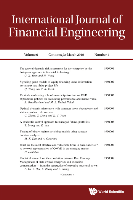
International Journal of Financial Engineering
Elevating financial practices through rigorous research.The International Journal of Financial Engineering, published by WORLD SCIENTIFIC PUBL CO PTE LTD, is a premier academic journal dedicated to advancing the field of financial engineering. With a ISSN of 2424-7863 and an E-ISSN of 2424-7944, this journal offers a platform for groundbreaking research that intersects finance, mathematics, and computational techniques, promoting innovative solutions to complex financial problems. As a vital resource for researchers, practitioners, and students alike, the journal aims to disseminate cutting-edge methodologies and empirical studies that drive the financial industry forward. While the journal operates under a subscription model, its rigorous peer-review process ensures that only high-quality research is published, maintaining its significance within the academic community. With an ever-growing focus on quantitative finance and derivative pricing, the International Journal of Financial Engineering is essential for those seeking to enhance their understanding of financial markets and engineering.

Intelligent Systems in Accounting Finance & Management
Bridging technology and finance for smarter solutions.Intelligent Systems in Accounting, Finance & Management is a leading journal published by John Wiley & Sons Ltd, recognized for its commitment to advancing knowledge and research in the intersection of artificial intelligence and financial decision-making. With an ISSN of 1055-615X and an E-ISSN of 1099-1174, this journal serves as a vital resource for academics, practitioners, and students interested in the innovative applications of intelligent systems within the realms of accounting, finance, and management. Although it operates under traditional access options, the journal features a wide range of high-quality peer-reviewed articles designed to enhance understanding of complex financial environments and promote effective decision-making through technology. Its editorial standards ensure impactful research that resonates within both theoretical and applied contexts, making it an essential publication for those dedicated to furthering the field of financial intelligence systems.
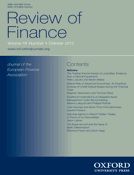
Review of Finance
Pioneering high-quality research in finance and beyond.The Review of Finance, published by Oxford University Press, stands as a premier academic journal in the fields of Finance, Accounting, and Economics. With an ISSN of 1572-3097 and an impressive track record stretching from 2001 to 2024, this journal is consistently recognized for its high-quality research, reflected in its Q1 rankings across key categories, including Accounting, Finance, and Economics and Econometrics. The Review of Finance is dedicated to advancing the understanding of financial phenomena through robust empirical and theoretical insights, making it an essential resource for researchers and professionals alike. Additionally, its strong Scopus rankings, placing it in the top percentiles, highlight its influence and relevance in ongoing academic discourse. Although the journal is not open access, it remains widely accessible through academic institutions, ensuring that its valuable contributions reach an extensive audience. The editorial board invites submissions that promise to further engage the academic community in the dynamic intersections of finance, accounting, and economic research.

JOURNAL OF FINANCIAL AND QUANTITATIVE ANALYSIS
Elevating Knowledge in Finance Through Empirical EvidenceJOURNAL OF FINANCIAL AND QUANTITATIVE ANALYSIS, published by Cambridge University Press, is a premier peer-reviewed journal that has been at the forefront of the finance and economics fields since its inception in 1966. With a notable impact factor reflecting its Q1 status in Accounting, Economics and Econometrics, and Finance for 2023, the journal is recognized for its substantial contributions to both theoretical and empirical research. Researchers and practitioners alike benefit from its comprehensive scope, addressing critical issues in financial analysis and quantitative methods. Although the journal does not currently offer open access, it remains widely accessible through institutional subscriptions. The editorial team is committed to fostering rigorous academic discussions that shape the future of finance and economics, making it an essential resource for academics, students, and industry professionals seeking to deepen their understanding of these vital disciplines. For more than five decades, this journal has continued to be an indispensable platform for disseminating influential research, thus solidifying its role as an essential cornerstone in the financial and quantitative analysis community.
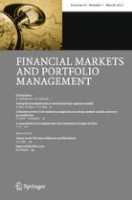
Financial Markets and Portfolio Management
Exploring the Dynamics of Markets and Portfolios.Financial Markets and Portfolio Management is a renowned peer-reviewed journal published by Springer, focusing on the dynamic and evolving intersections of finance, economics, and accounting. With an ISSN of 1934-4554 and an e-ISSN of 2373-8529, the journal provides a platform for innovative research on financial markets, investment strategies, and portfolio management techniques. It boasts an impactful presence in the academic community, with a Scopus ranking placing it in the 58th percentile in Finance and the 51st percentile in Accounting, underscoring its significance in both fields. Spanning coverage from 2006 to 2024, the journal offers essential insights for researchers, practitioners, and students interested in the latest developments and empirical analyses in financial practices. Although it does not offer open access options, its rigorous editorial standards ensure high-quality content accessible to library and institutional resources. The journal plays a pivotal role in advancing knowledge and fostering dialogue in an increasingly complex financial landscape.
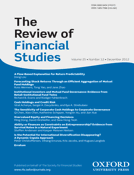
REVIEW OF FINANCIAL STUDIES
Exploring Innovations in Finance and EconomicsREVIEW OF FINANCIAL STUDIES, published by Oxford University Press Inc, stands as a premier academic journal in the realms of accounting, economics, and finance. With an impressive Impact Factor that reflects its high citation rates and broad influence, this journal, with an ISSN of 0893-9454 and E-ISSN 1465-7368, is considered a cornerstone for researchers, academics, and professionals seeking to contribute to and stay updated on groundbreaking developments in financial studies. Since its inception in 1996, it has established a robust reputation, consistently ranking in the Q1 category across multiple disciplines, highlighting its elite status in the global academic landscape. The Scopus rankings further reinforce its importance, positioning it at the forefront of business, economics, and finance research. While the journal is not open access, it offers vital insights and comprehensive studies that foster a deeper understanding of contemporary financial issues and methodologies. Located in the United Kingdom, the REVIEW OF FINANCIAL STUDIES is an essential resource for those aiming to advance their knowledge and research in this dynamic field.
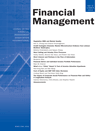
FINANCIAL MANAGEMENT
Advancing the Frontiers of Financial KnowledgeFINANCIAL MANAGEMENT is a premier academic journal published by Wiley, focusing on the intricate domains of Accounting, Economics, and Finance. With an ISSN of 0046-3892 and an E-ISSN of 1755-053X, this esteemed journal has made significant contributions to the global discourse on financial practices and theories since its establishment in 1996. Situated within the top tier (Q1) in its respective fields, FINANCIAL MANAGEMENT ranks impressively in Scopus, positioned at 30 out of 176 in Accounting and 57 out of 317 in Finance, reflecting its high impact and relevance in the scholarly community. The journal is known for its rigorous peer-review process and publishes cutting-edge research aimed at advancing knowledge and practice in financial management. Although it does not offer Open Access, it remains accessible through institutional subscriptions, ensuring that researchers, professionals, and students remain at the forefront of developments in financial management. With a commitment to excellence, FINANCIAL MANAGEMENT continues to be an indispensable resource for those seeking to deepen their understanding of this critical field.
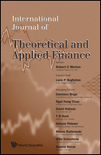
International Journal of Theoretical and Applied Finance
Elevating financial knowledge with rigorous scholarship.International Journal of Theoretical and Applied Finance is a distinguished publication in the field of finance, serving as a critical platform for the dissemination of innovative research and theoretical insights since its inception in 2003. Published by World Scientific Publishing Co Pte Ltd in Singapore, this journal boasts an impressive Q2 ranking in the realms of Economics, Econometrics, and Finance (miscellaneous) and a solid Q3 status in Finance for 2023. With a commitment to advancing knowledge in the complex world of theoretical frameworks and applied financial practices, it welcomes original research articles, comprehensive reviews, and case studies that explore varied facets of finance. Researchers, professionals, and students benefit from the journal's rigorous peer-review process and an ever-expanding repository of knowledge, making it an indispensable resource in the financial academic community. The journal does not currently offer open access, reflecting its selective approach to publishing high-quality content aimed at a specialized audience.